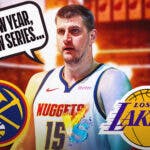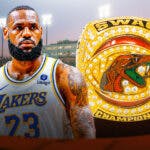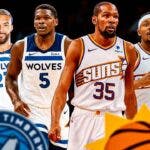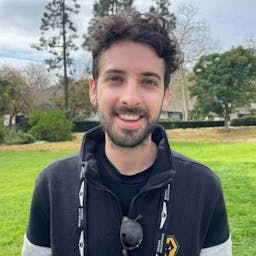In my New Year's resolutions for the Los Angeles Lakers (and on last week's episode of Lakers Multiverse), I argued that the Lakers need to accelerate the process of discovering an identity. It's too late in the 2021-22 NBA season to continue tinkering with styles, even while Anthony Davis and Kendrick Nunn remain out with knee injuries. Tighten the rotation, commit to one or two tactical approaches, and roll with it.
Recently, that identity has been defined by small ball, often with LeBron James at center.
Evidently, Frank Vogel reads ClutchPoints, because in their first game of 2022 — a testy 108-103 win over the Minnesota Timberwolves — the Lakers did just that.
Hearing Lakers PA announcer Lawrence Tanter end the Lakers' starting lineup intro with "At center, number 6, 6'9, from St. Vincent, St. Mary's high school…" still sounds odd
— Michael Corvo (@michaelcorvoNBA) January 3, 2022
Facing a Timberolves squad without Karl-Anthony Towns, the Lakers were outrebounded 56-28. The Wolves had 20 offensive boards. Minnesota's starting center for the evening, 6-foot-9 Naz Reid, dominated the Lakers through three quarters and finished with 23 points and 11 rebounds — both season-high marks.
Vogel — who has a historical proclivity for two-big lineups (think of Roy Hibbert+David West, and AD+JaVale/Dwight) — admitted that he had to “resist the urge” to deploy Dwight Howard (or DeAndre Jordan) as the Wolves dominated inside. Yet, he kept both centers on the bench for 48 minutes and trusted the offensive firepower of his group. The Lakers outscored the Wolves 30-23 in the final frame.
Vogel said the Lakers prepped for an uphill battle on the boards vs. Minnesota. They were outrebounded by 35 in the first two meetings combined.
“The glass — that was a concern,” Vogel said postgame. “If (Reid's) scoring in the low post against (Stanley Johnson)'s toughness, we can live with that. … But the glass was not just Reid. When we played them the first two games big, they killed us on the glass. They're a great perimeter-crashing team. That was going to be an issue whether we were big or small.”
The Lakers have increasingly turned to small ball since Anthony Davis sprained his MCL. Entering Sunday, they had a net rating of 6.0 with LeBron at the 5. Many of those minutes, though, came while their depth was depleted due to COVID-19 protocols. Since everybody cleared protocols on Friday — plus the addition of Johnson, a rugged forward — the Lakers thrashed the Portland Trail Blazers going fully centerless, then hung on for the tough dub on Sunday.
Inevitably, there are going to be teams against whom the Lakers cannot play small for the duration of a game. They can't ask LeBron James, Carmelo Anthony, and Stanley Johnson to handle the likes of Deandre Ayton, Nikola Jokic, or Rudy Gobert, for instance. In general, the Lakers' “centerless” lineups will continue to struggle defensively and on the boards — barring stretches of unsustainable all-out effort from LeBron and co.
“If we're going to explore this style of play, we have to learn to deal with this,” Vogel acknowledged.
Reid scored all of his 23 points in the first three quarters before LeBron switched onto him for the final period.
“LeBron James can do it all,” Vogel praised. “We decide to put him defensively on the center to slow him down, and he's still executing the pick-and-roll coverages well when (Anthony Edwards) is coming off. He had a terrific defensive fourth, and really a defensive game. But that's LeBron James.”
LeBron was very active defensively in the 4th pic.twitter.com/CsLHLisIR0
— pickuphoop (@pickuphoop) January 3, 2022
Inconsistency has been the Lakers' ultimate hindrance this season. The most direct way to address that is by committing to a style and sticking to it. Unlike missed shots, Russell Westbrook turnovers, or so many other aspects of basketball, a consistent approach is controllable.
This is who they are, at least for now. And for the most part, it's working.
“We’re playing good basketball as of late,” LeBron assessed. “Even with some of the losses we had, we were trending in the right direction and I believe we continued to do that tonight. Giving up 20 offensive rebounds is a lot. We have to do a better job of that. We gave up one point per offensive rebound, which is really good. They had 20 second-chance points off 20 offensive rebounds. We were at least making an effort to get back out and get stops, so that’s good.”
As for how to integrate Anthony Davis back into the mix, LeBron isn't concerned — as he articulated to my podcast co-host Cooper Halpern when asked what the Lakers can take from their small-ball success when AD returns.
“AD is an easy puzzle piece to fit in, so I'm not quite worried about what we do when AD comes back. You place AD on the floor, AD's a top-five, top-10 player in our league, so we become a better team right away. … (Vogel) knows that he can go to a smaller lineup when AD comes out of the game, he knows he can go to myself and Melo at the 4 and 5. To have that in your back pocket, it benefits our club. But I'll be happy when AD gets back. I'll tell you that.”




